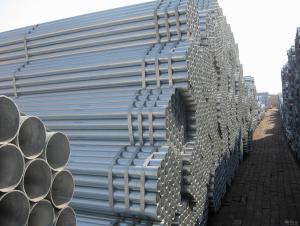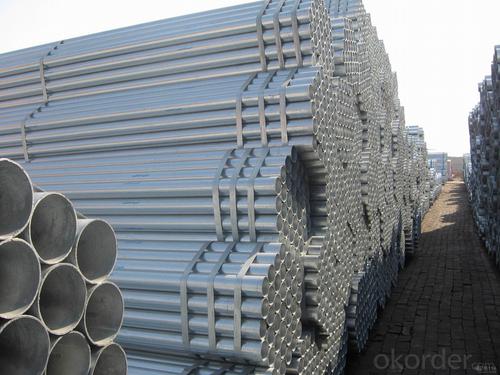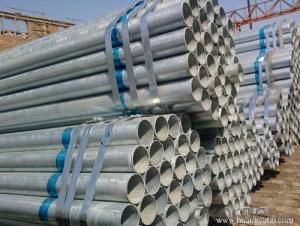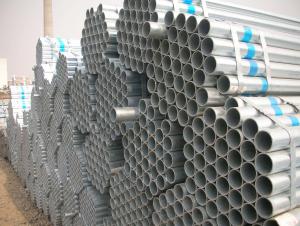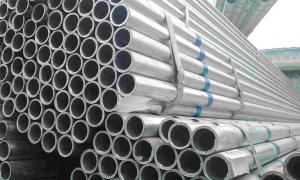Hot Dipped or Pre-galvanized Galvanized Pipe A53 Q195 100g Hot Dipped
- Loading Port:
- Tianjin
- Payment Terms:
- TT or LC
- Min Order Qty:
- 45 m.t.
- Supply Capability:
- 7000 m.t./month
OKorder Service Pledge
OKorder Financial Service
You Might Also Like
1、Structure of Hot Dipped or Pre-galvanized Galvanized Pipe A53 Q195 100g Hot Dipped or Pre-galvanized Pipe:
The surface of Hot Dipped or Pre-galvanized Galvanized Pipe America Standard A53 Q195 100g Hot Dipped or Pre-galvanized Pipecan increase the corrosion resistance of the steel tube, prolong service life. Galvanized pipe is widely used, in addition to water, gas, oil and other general low pressure fluid pipelines. It is also used in the petroleum industry, especially for offshore oil field of oil well pipe and oil pipe, chemical, coking equipment of oil heater, condensation cooler, coal run oil exchanger tube, and trestle pile, the mine tunnel support frame tube.
2、Main Features of Hot Dipped or Pre-galvanized Galvanized Pipe A53 Q195 100g Hot Dipped or Pre-galvanized Pipe:
• High manufacturing accuracy with standard
• High strength and stable
• Good visual effect
• Reasonable price
• Small inertia resistance
• Strong heat dissipation ability
3、Hot Dipped or Pre-galvanized Galvanized Pipe A53 Q195 100g Hot Dipped or Pre-galvanized Pipe Specification:
Standard | GB, DIN, ASTM ASTM A106-2006, ASTM A53-2007 |
Grade | 10#-45#, 16Mn 10#, 20#, 45#, 16Mn |
Thickness | 1 - 33 mm |
Section Shape | Round |
Outer Diameter | 21 - 610mm |
Place of Origin | Tianjin, China (Mainland) |
Secondary Or Not | Non-secondary |
Application | Hydraulic Pipe |
Technique | Cold Drawn |
Certification | API |
Surface Treatment | factory state or painted black |
Special Pipe | API Pipe |
Alloy Or Not | Non-alloy |
Length | 5-12M |
Outer Diameter | 21.3-610mm |
Grade | 20#, 45#, Q345, API J55, API K55, API L80, API N80, API P110, A53B |
Standard | ASME, ASTM |
1) Material:20#(ASTM A 106/A53 GRB.API5LGRB,GB),45#,16Mn,10#.
2) Specification range:OD:21.3-610mm,WT:6-70mm,length:6-12m or according to the requirement of clients.
3) Excutive standards:GB,ASME API5L.ASTM A 106/A53,Despite of the above standards,we can also supply seamless steel pipe with standard of DIN,JIS,and so on,and also develop new products according to the requirements of our clients!
4) Surface:black lacquered,varnish coating or galvanized.
5) Ends:Beveled or square cut,plastic capped,painted.
6) Packing:bundles wrapped with strong steel strip,seaworthy packing.
4、Packaging & Delivery
Packaging Details: | seaworthy package,bundles wrapped with strong steel strip |
Delivery Detail: | 15-30days after received 30%TT |
5、FAQ of Hot Dipped or Pre-galvanized Galvanized Pipe A53 Q195 100g Hot Dipped or Pre-galvanized Pipe:
①How is the quality of your products?
Our products are manufactured strictly according to national and internaional standard, and we take a test
on every pipe before delivered out. If you want see our quality certifications and all kinds of testing report, please just ask us for it.
Guaranteed: If products’ quality don’t accord to discription as we give or the promise before you place order, we promise 100% refund.
②How about price?
Yes, we are factory and be able to give you lowest price below market one, and we have a policy that “ for saving time and absolutely honest business attitude, we quote as lowest as possible for any customer, and discount can be given according to quantity”,if you like bargain and factory price is not low enough as you think, just don’t waste your time.Please trust the quotation we would give you, it is professional one.
③Why should you chose us?
Chose happens because of quality, then price, We can give you both.Additionally, we can also offer professional products inquiry, products knowledge train(for agents), smooth goods delivery, exellent customer solution proposals.Our service formula: good quality+good price+good service=customer’s trust
SGS test is available, customer inspection before shipping is welcome, third party inspection is no problem.
6、 Hot Dipped or Pre-galvanized Galvanized Pipe A53 Q195 100g Hot Dipped or Pre-galvanized Pipe: Images:
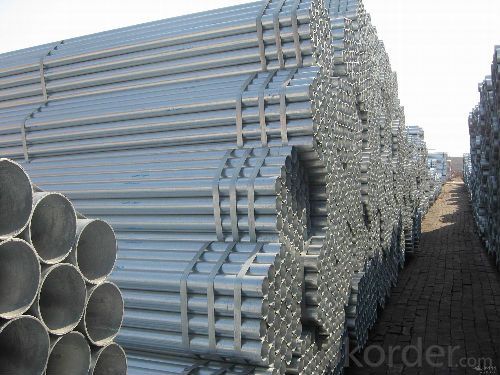
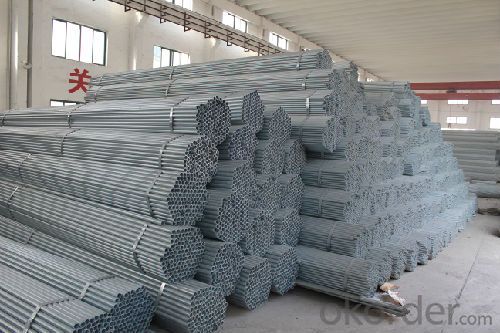
- Q: Can steel pipes be used for underground stormwater drainage?
- Yes, steel pipes can be used for underground stormwater drainage. Steel pipes are durable and have a high strength-to-weight ratio, making them suitable for underground applications. They can withstand heavy loads and resist corrosion, ensuring long-term performance in stormwater drainage systems. Additionally, steel pipes can be easily welded, allowing for customization and flexibility in the design and installation process. However, it is important to ensure proper corrosion protection, such as applying a protective coating or using corrosion-resistant alloys, to prevent degradation over time. Regular maintenance and monitoring are also recommended to ensure the pipes remain in good condition and continue to effectively drain stormwater.
- Q: How are steel pipes used in tunnel construction?
- Steel pipes are commonly used in tunnel construction for various purposes such as drainage, ventilation, and support. These pipes are installed to facilitate the removal of water from the tunnel, ensuring a dry working environment. They also serve as conduits for supplying fresh air and removing exhaust fumes. Additionally, steel pipes are utilized as structural supports, providing stability and reinforcement to the tunnel walls and ceilings.
- Q: What are the advantages of using pre-fabricated steel pipes?
- There are several advantages of using pre-fabricated steel pipes in various applications. Firstly, pre-fabricated steel pipes offer a high level of durability and strength. Steel is known for its robustness and resistance to external forces, making it an ideal material for constructing pipes that need to withstand high pressure or heavy loads. This durability ensures that pre-fabricated steel pipes have a longer lifespan compared to other materials, reducing the need for frequent replacements and maintenance. Secondly, pre-fabricated steel pipes provide excellent corrosion resistance. Steel pipes are often coated with protective layers, such as galvanization or epoxy, which prevent rusting and corrosion. This corrosion resistance is particularly crucial when the pipes are used in industries or environments where they may come into contact with moisture, chemicals, or other corrosive substances. By utilizing pre-fabricated steel pipes, the risk of leaks, deterioration, or failure due to corrosion is significantly reduced. Another advantage of pre-fabricated steel pipes is their versatility and ease of installation. These pipes are manufactured to precise specifications before being delivered to the site, allowing for quick and efficient installation. Their modular nature means that they can be easily assembled, disassembled, and reconfigured as needed, making them suitable for a wide range of applications, from industrial settings to residential construction. Moreover, pre-fabricated steel pipes can be easily integrated with other building components, such as fittings, valves, and connectors, ensuring a seamless connection and reducing installation time and costs. Furthermore, pre-fabricated steel pipes are more environmentally friendly compared to other materials. Steel is a highly recyclable material, and using pre-fabricated pipes reduces the consumption of natural resources and energy required for their production. Additionally, the long lifespan of steel pipes reduces waste generation and the need for frequent replacements, further contributing to sustainability efforts. Lastly, pre-fabricated steel pipes offer cost advantages. While the initial cost of steel pipes may be higher than some other materials, their durability and low maintenance requirements result in long-term cost savings. The reduced need for repairs, replacements, and maintenance, as well as the ease of installation, translates into lower overall project costs and reduced downtime. In summary, the advantages of using pre-fabricated steel pipes include durability, corrosion resistance, versatility, ease of installation, environmental friendliness, and cost-effectiveness. These benefits make pre-fabricated steel pipes a preferred choice for various industries and applications.
- Q: What is the role of steel pipes in the food processing industry?
- Steel pipes play a crucial role in the food processing industry as they are used for various applications such as conveying fluids, gases, and other materials throughout the production process. These pipes are resistant to corrosion, have high strength, and can withstand extreme temperatures, making them ideal for transporting food products safely and hygienically. They are widely used for transporting water, steam, and other liquids, as well as for transferring ingredients, such as grains, oils, and sauces. Additionally, steel pipes are utilized in the construction of food processing equipment, such as mixers, blenders, and storage tanks, ensuring the durability and integrity of the entire production system.
- Q: How are steel pipes used in the construction of offshore oil rigs?
- Steel pipes are commonly used in the construction of offshore oil rigs for various purposes. They are primarily utilized for drilling operations, transporting oil and gas from the seabed to the surface, and for the installation of pipelines and risers. These pipes are known for their strength, durability, and ability to withstand harsh offshore environments, making them an essential component in ensuring the safe and efficient extraction of oil and gas from deep-sea reserves.
- Q: How do steel pipes perform in extreme temperature variations?
- Steel pipes perform well in extreme temperature variations due to their high thermal conductivity and low thermal expansion coefficient. This allows them to efficiently transfer heat and withstand the expansion and contraction caused by temperature fluctuations without compromising their structural integrity.
- Q: How are steel pipes used in the manufacturing of bicycles?
- Steel pipes are commonly used in the manufacturing of bicycles as they provide strength, durability, and flexibility. They are used to create the frame, handlebars, and other structural components of the bike. The steel pipes are cut, shaped, and welded together to form the frame, providing a sturdy and reliable structure for the bicycle.
- Q: What is the importance of corrosion resistance in steel pipes?
- Corrosion resistance in steel pipes is crucial as it helps prevent the deterioration of the pipes due to chemical reactions with substances in their surroundings. This resistance ensures the longevity and durability of the pipes, minimizing the risk of leaks, clogs, and structural failures. Additionally, it helps maintain the quality and safety of the transported fluids or gases, preventing contamination or degradation. Overall, corrosion resistance in steel pipes is essential for maintaining efficient and reliable infrastructure systems in various industries such as oil and gas, water supply, and construction.
- Q: Are steel pipes magnetic?
- It is true that steel pipes have the ability to become magnetic. Steel, mainly composed of iron, possesses ferromagnetic properties. Consequently, it can be magnetized or drawn towards magnets. Nevertheless, it is important to note that not all steel pipes are magnetic due to the variability in steel's magnetic characteristics, which depend on the specific composition and production methods employed. By incorporating specific alloying elements or subjecting it to particular heat treatments, steel can be rendered non-magnetic in certain instances. Moreover, the strength of the magnetic field exhibited by steel pipes varies based on factors such as pipe thickness and the magnet's intensity.
- Q: What are the uses of seamless steel tubes?
- Compared withsteel and roundsteelinsolid, flexural torsional strength in the same time, the weight is light, is a kind of economic section steel, widely used in the manufacture of structural parts and mechanical parts, such as the oil pipe, automobile transmission shaft, the bicycle frame and steel construction with scaffold with steel pipe manufacturing ring parts can be improved the utilization rate of materials, simplify the manufacturing process, material saving and working hours, such as rolling bearing ring, Jack and so on, has been widely used in steel pipe manufacturing.
Send your message to us
Hot Dipped or Pre-galvanized Galvanized Pipe A53 Q195 100g Hot Dipped
- Loading Port:
- Tianjin
- Payment Terms:
- TT or LC
- Min Order Qty:
- 45 m.t.
- Supply Capability:
- 7000 m.t./month
OKorder Service Pledge
OKorder Financial Service
Similar products
Hot products
Hot Searches
Related keywords
